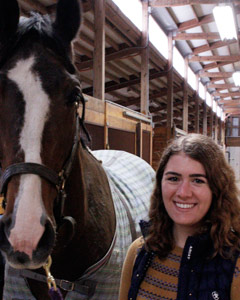Heitman’s Horse Research Project Making a Lot of Scents
Related Programs
Related Posts
Connect With Us
April 6, 2017

Kylie Heitman, ’17, has been doing aroma therapy research with some of the Albion College horses. She plans to present her work at this year’s Elkin R. Isaac Student Research Symposium as well as one day in a peer-reviewed journal.
By Chuck Carlson
Lena has something of a reputation.
It seems, in difficult and unusual situations, she can be a little fractious, a little unruly, a little nervous.
Kylie Heitman, ’17, the person who knows Lena the best, just smiles knowingly.
“She’s very high maintenance,” she said.
Lena is Heitman’s horse, one of her favorites and one she’s owned for years, boarding her occasionally over the years at the Nancy G. Held Equestrian Center.
But Lena is more than just a companion. For Heitman, she has also been the foundation for an intriguing science research project that, perhaps, could help a lot of horses and, in turn, their owners.
And while Lena provided part of the impetus for Heitman’s research, the biology major pulled ideas for the project from other places as well.
There was the organic chemistry lab course that focused on extracting citrus oil from orange peels.
There was the use of essential oils in her yoga class.
There was the way music impacts heart rates in her physiology lab.
And, of course, there was Lena.
Testing a hypothesis
Heitman has been a horse lover and rider since she was five and she has long dealt with the stress many horses experience when their daily routine is interrupted. New venues, loud noises, traveling in trailers can contribute increased heart rates and increased levels of cortisol in the blood that can add to their stress.
About a year ago, with Lena as the example as well as the other idea stitched together from orange peels and yoga and music, Heitman hit on a research idea.
Specifically, she wanted to know if an essential oil, in this case lavender, when diffused into the air could reduce stress in horses by suppressing their heart rates and cortisol levels.
She presented her idea to her faculty sponsor, biology professor Brad Rabquer, who gave her the OK.
With the help of two grants from the Foundation for Undergraduate Research, Scholarship, and Creative Activity and one from Dressage4Kids Inc. as well as receiving permission from the Institutional Animal Care and Use Committee and advice from the veterinary department at Michigan State University, Heitman set out to see if there was anything to her hypothesis.
She had seen a previous study done at another college on aroma therapy and its impact on horse stress and she was intrigued.
“I saw one study on lavender therapy but I altered it because I thought their study was flawed,” she said.
So, with the help of eight horses borrowed from the school’s equestrian center (Lena was not involved), Heitman set out to find evidence to support her hypothesis.
Over several fall weekends last year, and with the help of her dad, Dr. Eric Heitman, a veterinarian in Holland, the two placed a horse in a trailer and drove around Albion. Kylie used a lavender essential oil in a diffuser one time then took them out a second time using simply water.
She measured each of the horse’s heart rate and her dad drew blood samples for all the horses to measure the cortisol level.
“Cortisol is a molecule that can impair metabolism and sleep habits of horses and can decrease the overall well-being of the horse,” Heitman said.
Danielle Menteer, director of the equestrian center and who provided Heitman with the college-owned horses for the test, was also intrigued by her research.
“(Stress) can be a problem,” she said. “Some horses get very stressed-out about trailer riding. Their nature is to be claustrophobic and if they get trapped (such as in a trailer), they think they’ll get eaten. It takes a lot of trust for them to do that. It’s definitely worthwhile to study and it could be a relatively easy solution.”
Surprising data
Heitman found initially in her raw data no statistical difference between the levels of eight horses provided aroma therapy and those who were not. But as she dove deeper into the numbers, she did indeed find that those horses who were provided lavender did have a drop in their cortisol level.
“I was pretty surprised to see that,” she said. “I didn’t think it would work.”
She knows there is much research still to do but she was pleased enough with her results to present them April 22-26 at the Experimental Biology conference in Chicago and will also present her findings at the 28th annual Elkin R. Isaac Student Research Symposium April 19-20. She said her ultimate goal is to have her work published in a peer-reviewed journal.
After Albion, Heitman plans to take a gap year and work for a professional dressage trainer. After that, she has set her signs on graduate school studying in a biomedical science program involving veterinary medicine or in molecular physiology.
“I’d love to work with horses and science,” she said. “It would combine my two loves.”
As for her aroma therapy research, she admits that to find more definitive proof would require a lot more analysis and a far larger sample size. But she was pleased to have found what she already has.
“I’m very proud of my work,” she said. “This is an idea I came up with on my own and I think that’s pretty special.”
Lena would likely agree.
